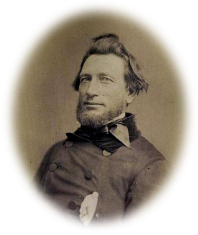4th.–I returned from Washington to-day, and was met by Colonel _____, who told me that the Brigade Commander had ordered him to have every hospital nurse who had taken any part in the purchase or presentation of the sword to me, dismissed from hospital and returned to the ranks. Well, now, who is to do that? I shall not; and I am glad that our Commander of Brigade has had pride enough to rise to this trick to find out who they are, rather, than (pencil in hand) to go sneaking around, asking “Who did it?” But he will miss fire; I shall dismiss nobody. I would rather he would catch himself in the little act of nosing around for information. I doubt not he will do it, or even dirtier work, rather than let slip any opportunity to gratify his vindictiveness.
After I received this verbal order, I sat down and wrote a defiant letter to the General, giving him my estimate of such doings, but then, feeling that it might redound to the injury of my friends, who were sharing his displeasure with me, I suppressed it, and sent a request to the General to be permitted to see him on the subject. I received the manly reply: “When the order is carried out!” If we never meet till I carry out that order, these eyes will for a long time be relieved of performing a most disagreeable duty. He may perform the duty; I shall not. In the hope, however, of relieving my friends from his further vindictiveness, I determined on another attempt to mollify, and here record the attempt, with its result:
Headquarters Medical Department,”
_____ Reg’t. _____ Vols,Colonel:–
Permit me, through you, to lay before Brigadier General _____, the following statement of facts: During the autumn and early part of the winter, the sickness in our regiment was unusually severe. Often, one half of our nurses were sick, and the rest worn down by fatigue. Rather than draw more strength from the regiment to our aid, I, after my official duties of the day were over, did, for weeks together, spend the greater part of every night in the unofficial, and, perhaps, undignified capacity of nurse, sending the exhausted nurses to their beds, and ministering to the wants of the sick. I rarely retired before two o’clock in the morning. During this time I was so fortunate as to gain the affection and gratitude of those for whom I labored, whilst many of them were still feeble, scarcely able to leave their beds, they decided to express their gratitude for my personal efforts, by a new year’s gift to me. They forgot that in becoming soldiers they ceased to be men, and gave vent to their feelings by presenting me a sword. If, in this presentation, there were “deliberations or discussions having the object of conveying praise or censure” for me, officially, as stated by the General, I have not been able to discover it. The circumstances attending–the spirit of the address–the inscription on the scabbard, all point to a different feeling and another object. With feelings of the deepest regret, I learn that this act of theirs meets the disapproval of the Brigade Commander, and that these men are to become the objects of censure and punishment.
For six months, these soldiers, by the direction of the Medical Director of the Army, have been thoroughly trained to the performance of those duties which are expected of hospital attendants on the field of battle, and I venture nothing in saying that the hospital under their care will show that they are second to no corps on the Potomac.
Under this state of facts, I respectfully appeal to the Brigade Commander, and beg that he will revoke the order dismissing these nurses and filling the hospital with inexperienced ones, at the moment when we are expecting to enter the battle field, and to need all the experience in our reach.
I waive all considerations of my own mortification, and will even cheerfully bear a public reprimand for myself. I put aside the consideration of the inconvenience which theer dismissal will bring on me; I put aside even their mortification and disappointment; but, in behalf of the sick, the wounded, the dying of my regiment, I appeal for the revocation of this order.
I beg, Sir, to remain,
Respectfully, your ob’t serv’t,
______ _______
Surgeon _____ Volunteers.To Colonel _______, Commanding _______ Vols.
With this last appeal I close the labors of this day.
